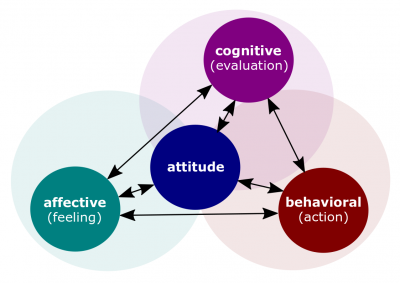Difference between revisions of "Cognitive attitude"
(→Related coursework) |
m (Gary moved page Cognitive component to Cognitive attitude) |
||
| (5 intermediate revisions by 3 users not shown) | |||
| Line 1: | Line 1: | ||
| − | [[Cognitive component]] is the opinion or belief segment of an attitude. | + | [[File:Attitude.png|400px|thumb|right|[[Attitude]]]][[Cognitive attitude]] (alternatively known as [[cognitive component]]) is the opinion or belief segment of an [[attitude]]. |
==Definitions== | ==Definitions== | ||
According to [[Organizational Behavior by Robbins and Judge (17th edition)]], | According to [[Organizational Behavior by Robbins and Judge (17th edition)]], | ||
| − | : | + | : '''[[Cognitive component]]'''. The opinion or belief segment of an [[attitude]]. |
| + | According to [[Management by Robbins and Coulter (14th edition)]], | ||
| + | : '''[[Cognitive component]]'''. That part of an [[attitude]] that's made up of the beliefs, opinions, knowledge, or information held by a person. | ||
| + | According to the [[Marketing Communications by Fill (5th edition)]], | ||
| + | : '''[[Cognitive component]]'''. A part of the attitude construct, this refers to the level of knowledge and beliefs held by individuals about a product and/or the beliefs about specific attributes of the offering. This represents the learning aspect of attitude formation. | ||
==Related concepts== | ==Related concepts== | ||
| Line 12: | Line 16: | ||
*[[Individual Decisions Quarter]]. | *[[Individual Decisions Quarter]]. | ||
| − | [[Category: Septem Artes Administrativi]][[Category: Articles]] | + | [[Category:Management]][[Category: Septem Artes Administrativi]][[Category: Articles]][[Category: Marketing Management]] |
Latest revision as of 18:41, 12 May 2023
Cognitive attitude (alternatively known as cognitive component) is the opinion or belief segment of an attitude.
Definitions
According to Organizational Behavior by Robbins and Judge (17th edition),
- Cognitive component. The opinion or belief segment of an attitude.
According to Management by Robbins and Coulter (14th edition),
- Cognitive component. That part of an attitude that's made up of the beliefs, opinions, knowledge, or information held by a person.
According to the Marketing Communications by Fill (5th edition),
- Cognitive component. A part of the attitude construct, this refers to the level of knowledge and beliefs held by individuals about a product and/or the beliefs about specific attributes of the offering. This represents the learning aspect of attitude formation.
